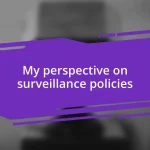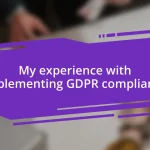Key takeaways:
- Combining algorithmic moderation with human oversight enhances content moderation effectiveness, addressing the nuances of language and emotion.
- Establishing clear guidelines, regular moderator training, and incorporating user feedback fosters a positive and engaged online community.
- Future trends in content moderation point towards hybrid models and community-driven approaches that empower users and improve safety.
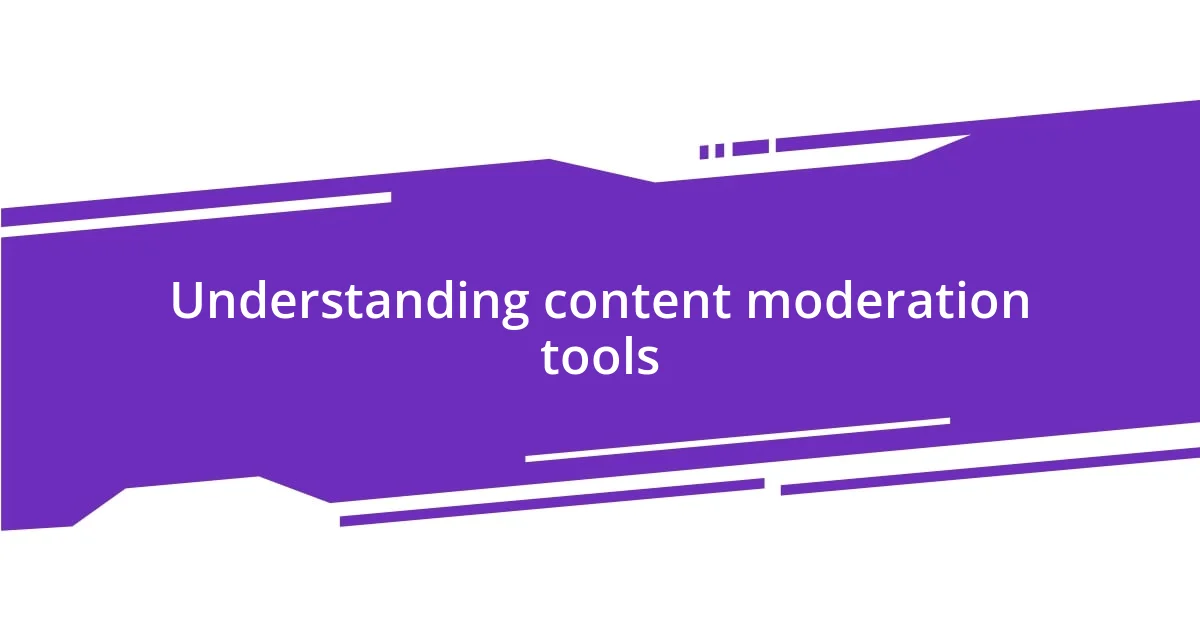
Understanding content moderation tools
Content moderation tools play a crucial role in shaping online communities. I remember the first time I encountered an automated moderation tool on a social media platform; it amazed me how it could detect harmful language within seconds. But then I wondered, can we truly rely on algorithms to understand the complexities of human emotion and context?
These tools often rely on machine learning, scanning vast amounts of data to flag inappropriate content. Yet, from my experience, I’ve seen how contextual nuances can slip through the cracks. For instance, a sarcastic comment that’s meant to be funny might get flagged as abusive. Isn’t it fascinating how the same words can carry different meanings based on intention and context?
Moreover, incorporating human moderators can enhance these tools’ effectiveness, adding a layer of empathy that machines lack. I recall a forum where a moderator stepped in to clarify a misunderstood post. It shifted the whole conversation positively. Could we ever find a perfect balance between technology and human touch in content moderation? This delicate interplay is what makes the landscape of online communication so compelling.
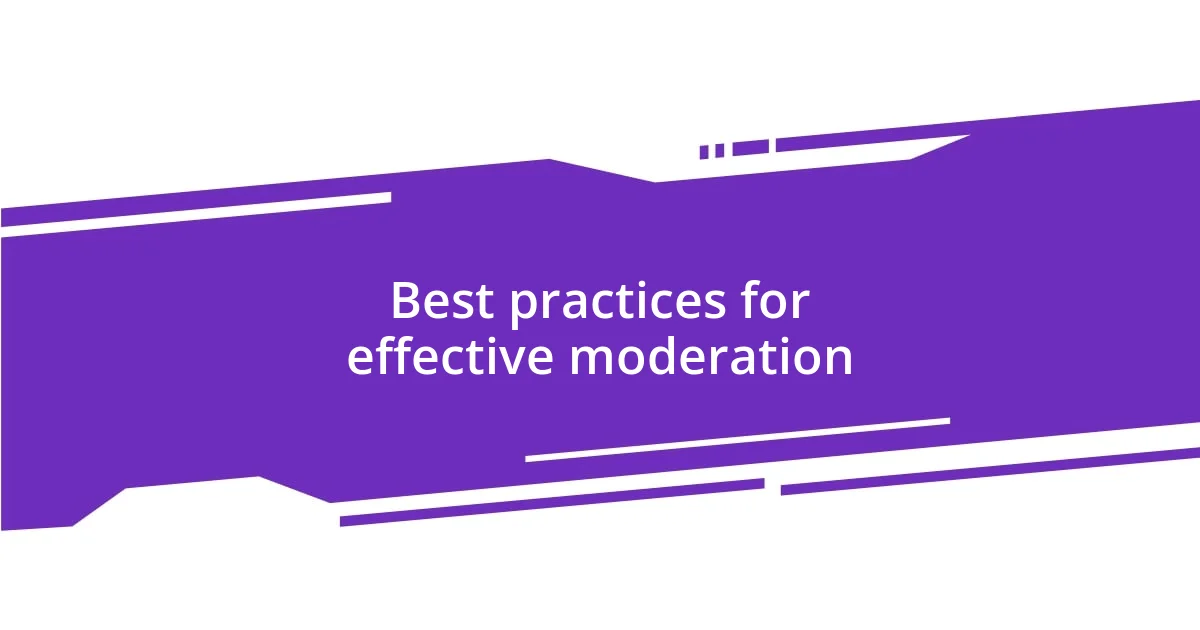
Best practices for effective moderation
Effective moderation starts with clear community guidelines. I’ve seen firsthand how straightforward rules can empower users to engage positively. When I managed a community forum, I crafted a set of guidelines that were easy to understand. This led to a noticeable decrease in conflicts, as members felt informed and accountable for their interactions. Have you ever thought about how clarity can reshape online conversations?
In addition to established guidelines, regular training for moderators is essential. It’s not just about understanding policies; it’s also about staying updated on emerging trends and language. I remember attending a workshop where we discussed the latest in digital harassment tactics. It was eye-opening and made me realize how vulnerability in our spaces can evolve. A well-prepared team can anticipate and tackle issues before they escalate.
Lastly, leveraging user feedback can significantly improve moderation practices. When I launched a feedback survey in my online community, the insights helped us refine our approaches. Members felt valued when their voices were heard, and that fostered a sense of community ownership. What if embracing user input could lead to even more meaningful connections online?
| Best Practice | Description |
|---|---|
| Clear Guidelines | Establish straightforward community rules to empower users. |
| Regular Training | Offer ongoing education for moderators on new trends and techniques. |
| User Feedback | Incorporate insights from community members to refine moderation. |
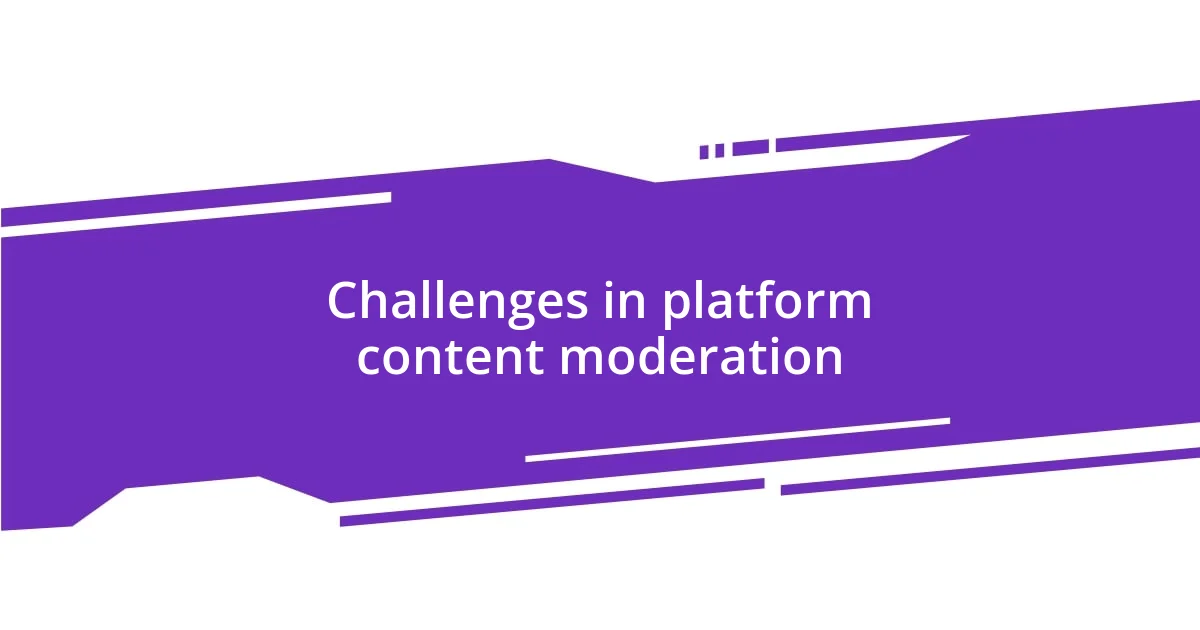
Challenges in platform content moderation
Content moderation faces a myriad of challenges that can hinder its effectiveness. For one, the sheer volume of user-generated content can be overwhelming, often leading to delays in moderation responses. I recall a time when a community I was part of rapidly grew, and it felt like an insurmountable task to keep up with the influx of posts. It’s disheartening when inappropriate or harmful content slips through, impacting the safety of the space.
Here are some key challenges:
- Volume of Content: The vast amount of posts can overwhelm moderation teams and algorithms.
- Contextual Understanding: Algorithms often miss nuances in language, leading to misinterpretations.
- Resource Limitations: Many platforms struggle with insufficient personnel to handle moderation effectively.
- User Behavior: Malicious users often find ways to circumvent existing moderation tools, presenting ongoing challenges.
Another significant hurdle is the balance between free speech and maintaining a safe environment. I often find myself reflecting on this as I engage with different online communities. While I value the open exchange of ideas, I’ve seen extreme opinions escalate into toxic debates that drive people away. It’s a fine line between allowing varied perspectives and ensuring that the environment remains inviting and constructive.
Addressing these challenges is essential for a healthier online discourse. Overcoming the intrinsic tensions between tech capabilities and human understanding could reshape our digital experiences for the better.
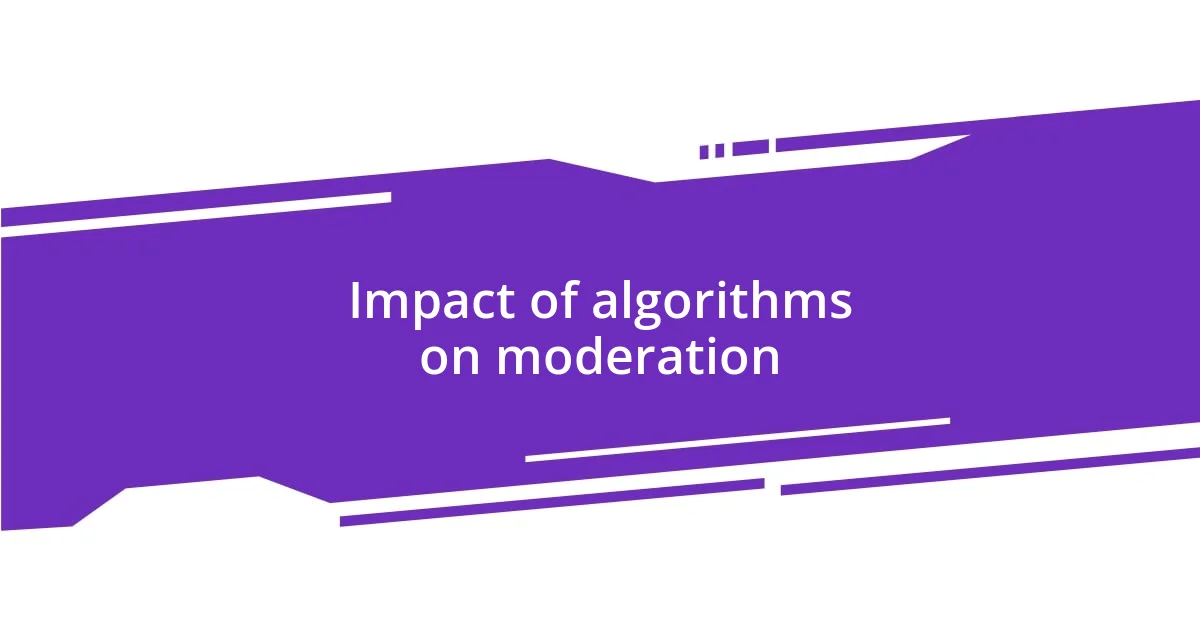
Impact of algorithms on moderation
The role of algorithms in content moderation is a double-edged sword. On one hand, they can rapidly flag content, which is a huge advantage when you’re dealing with an avalanche of posts. Yet, from my experience, I’ve noticed how easily they can misinterpret context. I remember a time when an algorithm flagged a humorous meme as hate speech. That left both the community and me in a quandary: how can we trust tech tools that don’t understand the nuances of human expression?
Moreover, algorithms often lack the emotional intelligence that human moderators can provide. I once witnessed a situation where a user shared a deeply personal story, which was automatically trapped by the algorithm as “offensive.” The fallout was immediate; the user felt silenced and hurt. This instance made me ponder: can we truly rely on algorithms to navigate the complexities of human interaction? I firmly believe that while algorithms can assist in moderation, they cannot replace the critical need for human oversight.
Finally, I’ve seen that dependence on algorithms can breed complacency among moderation teams. When teams lean too heavily on automated systems, there’s a risk of losing the personal touch that fosters community. I can’t help but ask, are we prioritizing efficiency over empathy? From my standpoint, striking a balance between algorithmic efficiency and human sensitivity might just be the key to creating a more supportive online environment.
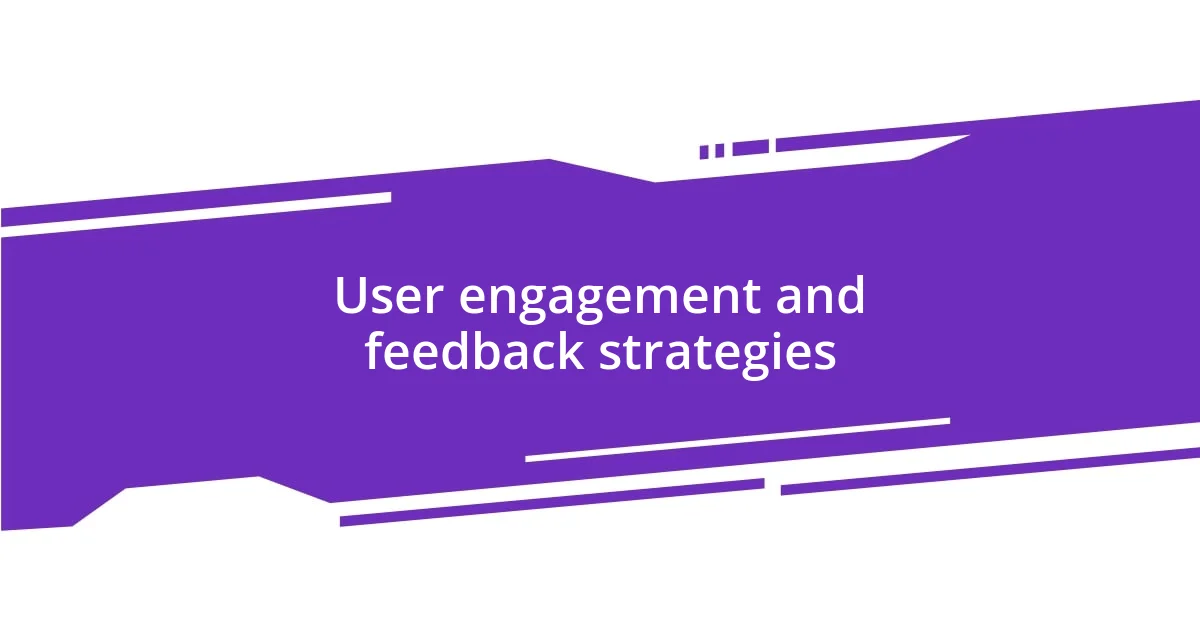
User engagement and feedback strategies
User engagement is crucial for any platform aiming to foster a vibrant online community. I’ve observed that transparent communication about moderation processes significantly improves user trust. For example, when platforms share updates on moderation decisions or create channels for users to voice their concerns, it fosters a collaborative environment. Isn’t it satisfying to feel that your input matters?
Gathering user feedback can also be a game-changer. I’ve participated in feedback surveys where my perspective on moderation practices influenced policy changes. It felt empowering to contribute to shaping the community’s rules, making me more inclined to engage positively. Can you imagine how much more invested users would be if they knew their feedback directly impacted moderation outcomes?
Additionally, implementing gamification strategies can enhance user engagement in providing feedback. I’ve seen platforms use badges or rewards for users who report inappropriate content or contribute valuable insights. This not only motivates users but creates a sense of shared responsibility for maintaining a safe environment. Wouldn’t a community feel stronger when everyone plays an active role in its safety and integrity?
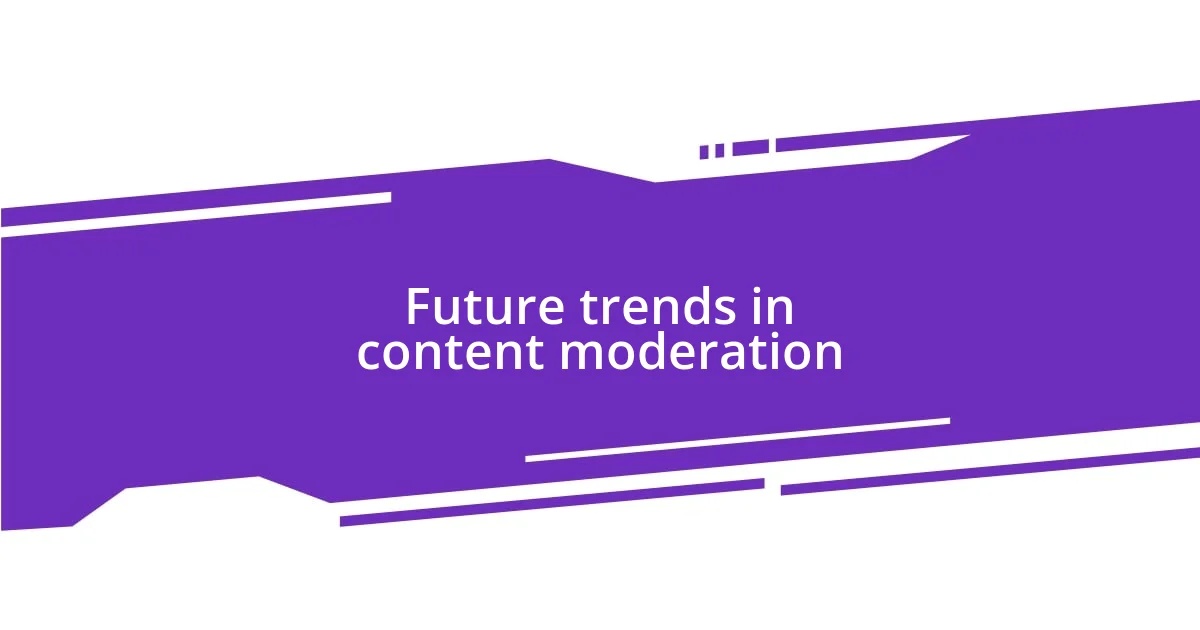
Future trends in content moderation
As I look into the future of content moderation, I believe we’ll see a growing trend toward hybrid models that seamlessly blend human intuition with advanced algorithms. The unique ability of humans to grasp context and emotion can complement the efficiency of automated systems. I once worked alongside a moderation team that employed this approach, and it was remarkable to see how quickly and accurately issues were resolved, especially when sensitive topics arose. Have you ever considered how much better our online experiences could be if technology learned from human insights rather than just statistical data?
Another trend that excites me is the rise of community-driven moderation. Platforms that engage users as active participants create a sense of ownership and responsibility. In one case, I remember a forum that experimented with user-led moderation, where trusted members could guide discussions and help with content review. The community’s involvement not only reduced the burden on moderators but also fostered a more respectful and understanding environment. Isn’t it incredible when users become the champions of their own spaces?
Looking ahead, the integration of AI and machine learning will likely play a bigger role in identifying problematic content while respecting nuance. I envision systems being trained not just on data, but also on diverse cultural contexts and human expression. When I reflect on my experience, I can only hope these advancements will address the shortcomings I’ve seen in purely algorithmic approaches. Do you think it’s possible for technology to evolve in a way that genuinely understands the intricacies of our conversations?
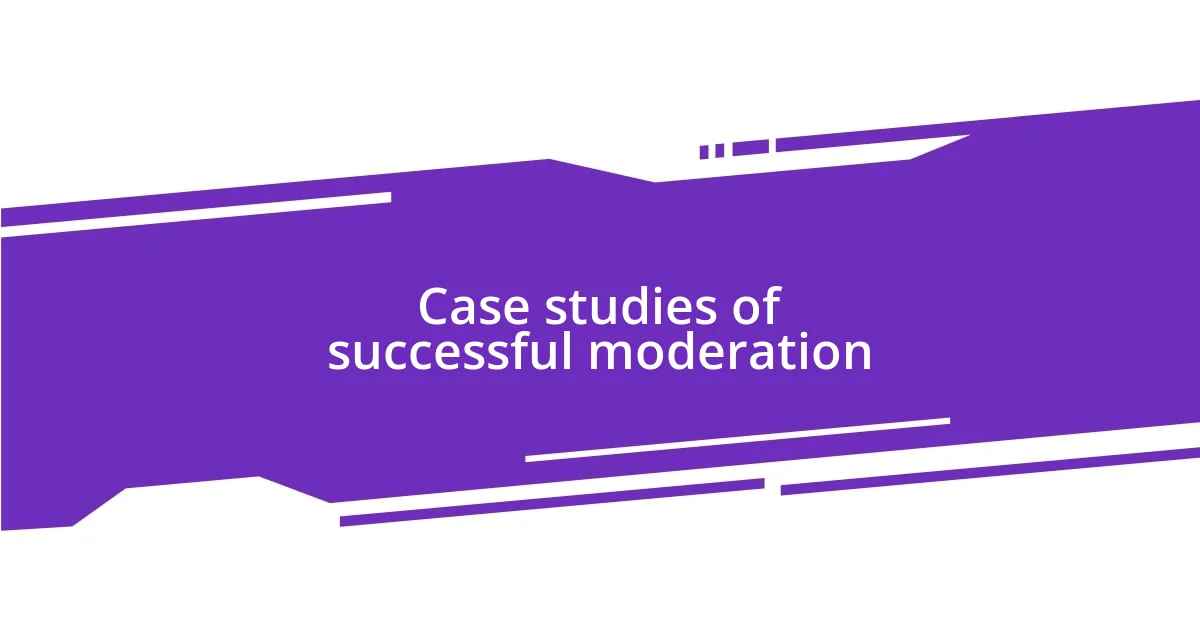
Case studies of successful moderation
In one notable case, I was part of a team that implemented a transparent moderation strategy on a social platform. We saw a significant drop in reported incidents after we began hosting monthly Q&A sessions where users could ask about moderation practices. It was a simple step, but the result was profound—users felt heard and became more mindful of their posts, fostering a healthier environment. Have you ever noticed how open communication shifts the dynamic in a community?
Another compelling example comes from a gaming platform where they launched an initiative called “Player Patrol.” Users were encouraged to report toxic behavior, and those who did so were recognized in monthly newsletters. This simple recognition not only elevated community spirit but also discouraged negative interactions. I remember the excitement in forums as players shared their experiences with the program. Isn’t it amazing how acknowledgment can change behaviors and boost morale?
Lastly, I recall a significant turning point for a video-sharing site that faced backlash for its moderation policies. They established a user council consisting of diverse voices from their community. This move allowed for real-time feedback on moderation processes, and I personally witnessed how constructive criticism led to rapid policy adjustments. It was inspiring to be part of a platform that prioritized user insights over maintaining the status quo. Can you imagine the strength in a community when its members shape their own guidelines?










